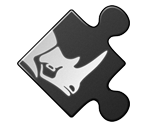Overview
User Data is a powerful set of APIs that allow plugin developers to attach custom data of any kind to any object derived from ON_Object. In order to take advantage of User Data, you are required to implement your own user data object by deriving a class from ON_UserData and overriding the required virtual functions.
In Rhino, the SDK adds a new standardized approach for adding User Data to objects called User Strings. The Rhino C/C++ SDK allows you to quickly attaches User Data in the form of a key-value string pair to any object derived from ON_Object. This feature is exposed to the C/C++ SDK as member functions on ON_Object:
ON_Object::SetUserString: attaches a user string to an object. This information will persist through copy construction, operator=, and file IO.ON_Object::GetUserString: gets a user string from an object.ON_Object::GetUserStringKeys: retrieves a list of all user string keys on an object.ON_Object::GetUserStrings: retrieves a list of all user strings on an object.
There are a number of advantages to User Strings:
- The mechanism is very simple - you do not have to derive any new classes.
- Rhino is responsible for all of the file IO.
- User Strings can hold text of any length and format, including XML.
- Since the mechanism is standard, user strings can shared between Rhino and other plugins. For example, you can use Rhino’s GetUserText and SetUserText commands to get and set user strings.
Example
The following example demonstrates how to add User Strings to a selected object…
CRhinoCommand::result CCommandTest::RunCommand( const CRhinoCommandContext& context )
{
bool bAttribute = true;
CRhinoGetObject go;
go.SetCommandPrompt( L"Select object to attach user text" );
go.AddCommandOptionToggle(
RHCMDOPTNAME(L"Location"),
RHCMDOPTVALUE(L"Object"),
RHCMDOPTVALUE(L"Attribute"),
bAttribute,
&bAttribute
);
for(;;)
{
CRhinoGet::result res = go.GetObjects( 1, 1 );
if( res == CRhinoGet::option )
continue;
if( res != CRhinoGet::object )
return cancel;
break;
}
const CRhinoObjRef& ref = go.Object(0);
const CRhinoObject* obj = ref.Object();
if( !obj )
return failure;
ON_wString key = L"test";
ON_wString text = L"sample text";
if( bAttribute )
{
// Attach user string to object's attributes
CRhinoObjectAttributes attribs = obj->Attributes();
attribs.SetUserString( key, text );
context.m_doc.ModifyObjectAttributes( ref, attribs );
}
else
{
// Attach user string to object's geometry
CRhinoObject* dupe = obj->DuplicateRhinoObject();
if( dupe )
{
ON_Geometry* geom = const_cast<ON_Geometry*>( dupe->Geometry() );
if( geom )
{
geom->SetUserString( key, text );
context.m_doc.ReplaceObject( ref, dupe );
}
}
}
return success;
}

